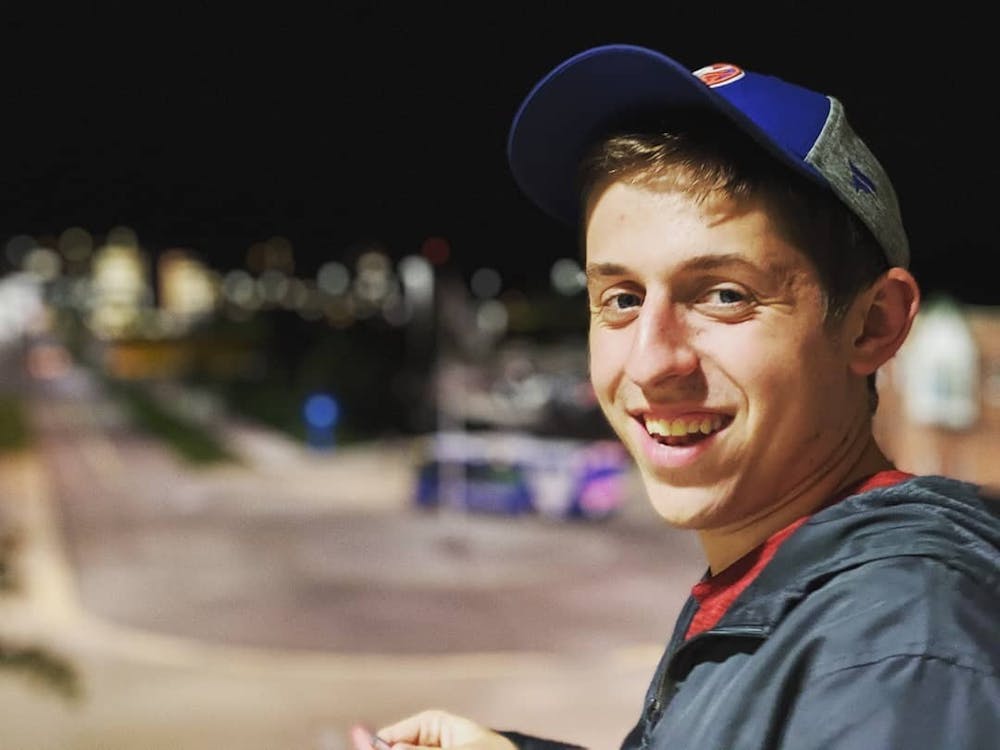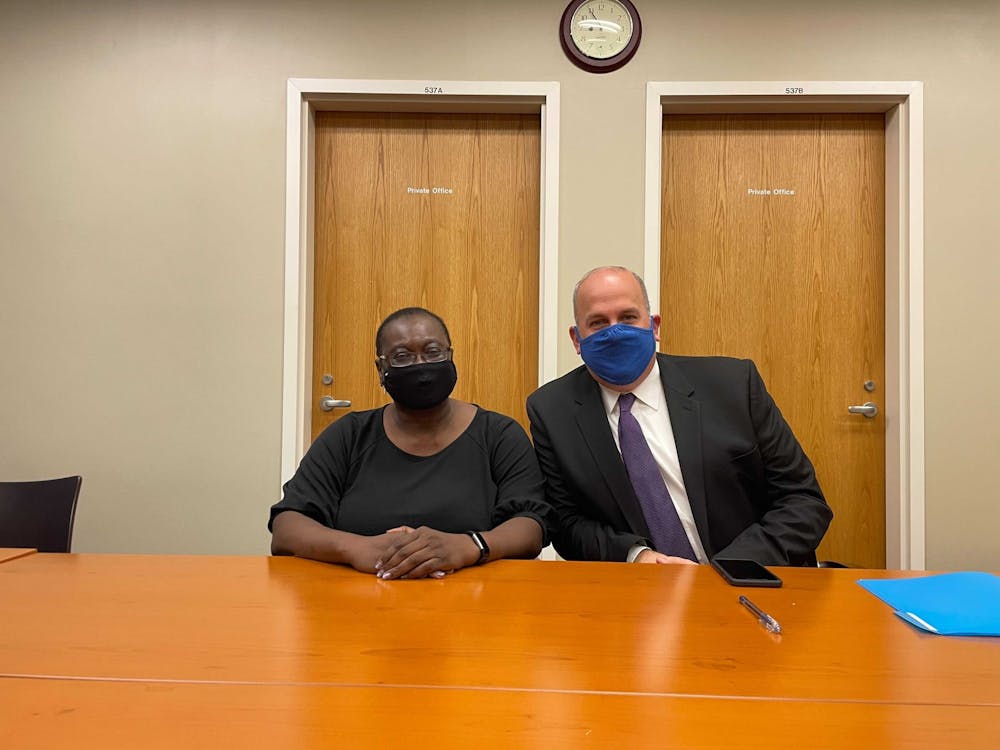In May, UB named Brian Hamluk vice president for student life.
Hamluk, a veteran educator with experience in a variety of roles at the University of Pittsburgh, Syracuse University and George Washington University, is tasked with providing students with resources and support for academic success, career development and community engagement, among others.
But his biggest priority, as he tells it, is working to improve student health and wellness — specifically, student mental health.
In light of worrying mental health trends and the COVID-19 pandemic, The Spectrum sat down with Hamluk and Sharon Mitchell, the director of Counseling Services, to discuss mental health on campus.
The following has been lightly edited for length and clarity:
The Spectrum: Can you talk about your exposure to student mental health while at Pittsburgh, Syracuse and George Washington? What did you observe about the mental health of students from working on those campuses?
Brian Hamluk: “So I think there’s a lot of commonalities [regardless of the institution] and mental health across college campuses. Fortunately for me coming here, I've been at very like-minded institutions. A lot of the challenges that students face are very similar. I think what each of the places that I have been at have had, which we have here at UB, is really a comprehensive approach to managing mental health and general wellness on campus. There’s a lot of different pieces to the puzzle, so to speak. The Counseling Center certainly is one piece of it, but education and outreach is another piece of it, health promotions, advocacy, working with students at orientation to educate them about resources that are available — educating parents as well. All of those types of things are the common threads that I have seen in all of these different places that really put the institution and put the student in the best possible situation in terms of managing their own mental health, and having a self-care approach.”
TS: Where does mental health rank on your list of priorities?
BH: “I have said consistently since I have arrived [five months ago] that student health and wellness is my No. 1 priority. So I've made it known. On day one it is our No. 1 [priority]. Our No. 1 initiative.”
TS: Students have heard this talk before, from other administrators. Why should they believe you’re different and that this is really a priority for you?
BH: Well, I think my track record. I’ve worked with counseling centers at other institutions before, I’ve worked with student health services before, I’ve worked in Campus Recreation before, all of these different pieces that impact the total wellness experience on campus. It’s a personal passion of mine; my undergraduate degree is in physical and health education. I agree with you, I think it’s easy for somebody to say, ‘Oh this is going to be my priority, but [mental health] is a personal interest of mine. No. 2, I don’t think the need has been greater in our timeframe for the general health and wellness of our students, and not just students on campus, [but] generally in society. I think the pandemic has certainly highlighted the need, but I think we've been trending in this direction for quite some time, and our students face some unique pressures as well.
TS: What have you noticed about mental health trends on campus? Do you think mental health is getting better? Worse? How does it compare to when you started at UB in 2003?
Sharon Mitchell: “Well, it’s certainly gotten worse but I feel like we’re sort of leveled off at this point. When I first started here there were eight counselors on staff, there’s now 23. So, obviously, it is a student need and it’s also an area that the university has already invested in. I was just thinking about the question you asked Brian, about why we should believe that [mental health is a priority]. One of our goals is to build a comprehensive wellness center on campus, and that is moving forward. I would say that, nationally, and UB is no different, anxiety and stress are probably the most common issues that students seek services for. We are living in stressful times, and so there’s a lot on students besides just studying. We’re in a pandemic, there’s been social and political unrest, so all of these things weigh on students and impact them personally. Last year was such a weird year, it’s hard for me to know if things are worse but I will say that students are anxious and stressed.”
BH: “The only other thing that I would add is, in addition to all of those things, obviously Sharon [Mitchell] talked about the significant resources that we’ve added in the Counseling Center. When we look at the overall, not just counseling, but the overall health of students, we’re moving Student Health Services to a brand-new facility for a better patient experience. I’ve been here five months and we’ve commissioned the executive team to begin the planning for the Health and Wellness Center, a facility that integrates the Counseling Center and Health Promotion and Pharmacy and Student Health Services and Campus Recreation. So all of the things that contribute to a student’s well being is going to be centralized in one facility and I think that truly will be a game-changer for the UB student experience so we don’t want to wait for that to be done which is why we started to make some moves with the Student Health Center to give them better patient experience. “
TS: Have you reached out to any students or student groups on campus to see how they feel about mental health?
BH: “I haven’t talked with formal groups, but I’ve had a lot of informal conversations with students, whether it’s been coffee chats or in the SU. They would all say it in different ways, but all have articulated that committing to mental health and committing to overall student wellness in general, is really important to the UB experience. All of them, you know, agree that the commitment needs to be there.”
TS: Mental health doesn’t seem to be getting better, so what’s going wrong here? Obviously, this isn’t uniquely a UB problem, but why are all these investments, all these resources, not producing the results you'd expect considering the investment?
SM: “Well, not everybody who could benefit accesses that help, so that’s part of the problem. I feel like people who do use our services do get better, I do think we are helpful to the students who utilize our services and that’s the feedback we’ve gotten. We give satisfaction and learning outcome surveys to get a sense of whether they feel like they’re making progress and then we also do some assessments when they come in and at different points, to see if they’re making progress. I think a lot of students rely on their existing circle of friends to be the ones that they talk to about things. Friends are helpful but they can't address everything that’s going on. “
TS: How do you build a campus where everybody feels like they’re in a strong, vibrant community, a community that has their back?
BH: “I think that’s always a challenge with a large institution when you’re dealing with 32,000 students — [all of whom have] diverse interests and needs, and, quite frankly, diverse desires of what they want out of their experience. I think that’s always a challenge. I think what we’re trying to do as I go through my first year and make an assessment of where we are in terms of student life is, we want to commit to some of those things that are broad and far-reaching and bring people together. For example, one of the things that I’ve identified is, ‘What are our initiatives around community service and civic engagement?’ I know that this is a passion point for [many] students who are coming in, community service has been a part of their life, they’re a little bit more community-minded in terms of their investment and their commitment. So that would be a place that I would look to invest in in the future — this has the opportunity to create a common experience for a number of people to bring different types of students together.”
The full Q&A can be found on The Spectrum’s website in the coming weeks.
We encourage students to prioritize their mental health. You are never alone. If you are in crisis, please consider calling the National Suicide Prevention Lifeline, at 800-273-8255 or UB Counseling Services, at 716-645-2720.
Julie Frey is the assistant news/features editor and can be reached at julie.frey@ubspectrum.com
Justin Weiss is the managing editor and can be reached at justin.weiss@ubspectrum.com

Justin Weiss is The Spectrum's managing editor. In his free time, he can be found hiking, playing baseball or throwing things at his TV when his sports teams aren't winning. His words have appeared in Elite Sports New York and the Long Island Herald. He can be found on Twitter @Jwmlb1.

Julie Frey is a senior news/features editor at The Spectrum. She is a political science and environmental studies double major. She enjoys theorizing about Taylor Swift, the color yellow and reading books that make her cry. She can be found on Twitter @juliannefrey.





